Saturday Feb 14, 2026
Saturday Feb 14, 2026
Friday, 2 November 2018 00:00 - - {{hitsCtrl.values.hits}}
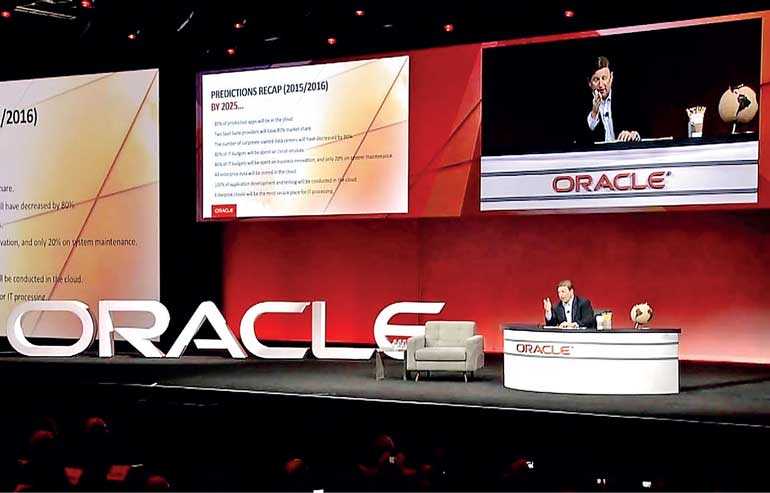
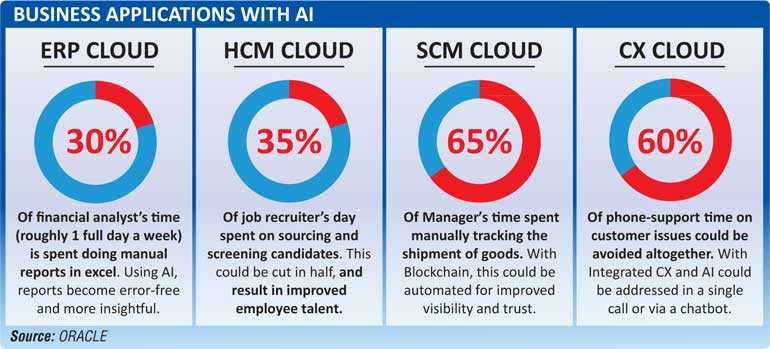
By Nisthar Cassim
Cloud technology adoption worldwide is progressing faster than originally anticipated and in the future the inclusion of features like Artificial Intelligence (AI) will accelerate productivity and innovation at the enterprise level, global Cloud solutions leader Oracle said last week.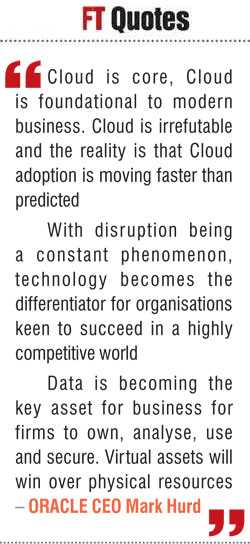
“Cloud is core, Cloud is foundational to modern business,” declared Oracle CEO Mark Hurd during his keynote at the Oracle OpenWorld 2018 in San Francisco, attended by over 60,000 customers, partners, analysts and media members including the Daily FT.
“Cloud is irrefutable and the reality is that Cloud adoption is moving faster than predicted,” he emphasised.
Hurd said that with disruption being a constant phenomenon, technology becomes the differentiator for organisations keen to succeed in a highly competitive world.
This challenge becomes formidable with data becoming the key asset for business for firms to own, analyse, use and secure.
“Virtual assets will win over physical resources,” he added. “Automation will reduce time to complete tasks, leading to reduction in maintenance costs and the creation of higher value jobs with companies being able to build new engagement models,” Hurd said.
Noting that AI changes the productivity equation, he said automation addresses more complex and time-consuming problems.
Better IT, better business
In that connect, the Oracle CEO said going forward, Cloud and integrated technologies like AI would help organisations lower costs while driving innovation and improving productivity. Additionally Oracle’s ground breaking autonomous database software will reduce cost and reduce risk.
Making several key predictions, Hurd said that by 2025 all Cloud applications would include AI and these Cloud apps would further distance themselves from legacy applications.
“AI will be pervasive and woven into all business apps and platform services. The same will be true for technologies like Blockchain,” the Oracle CEO pointed out.
He also said that by 2025, around 85% of interactions with customers would be automated.
“Customer experience is fundamentally changing and will dramatically improve with these emerging technologies,” he added.
For example, AI-based digital assistants increase productivity and humanise experiences, he said whilst AI-driven analytics helps businesses understand the complexity of all customer needs.
“Internet of Things brings customers closer to companies that serve them,” Hurd said.
Given the future scenario, Oracle CEO predicted that 60% of IT jobs have not been invented yet but would be by 2025.
Noting that automation would not replace all jobs but would invent new ones, Hurd said that by 2025 the new jobs would include data professionals (analyst scientist, engineers), robot supervisors, human to machine user experience specialists, smart city technology designers and AI-assisted healthcare technician.
Former forecasts
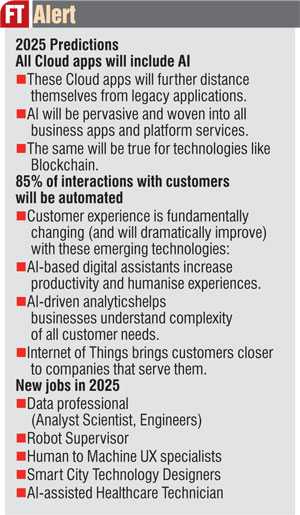 To drive home the point that Oracle CEO’s predictions last week were likely, Hurd recalled some of the forecasts made by him at the previous OpenWorld events.
To drive home the point that Oracle CEO’s predictions last week were likely, Hurd recalled some of the forecasts made by him at the previous OpenWorld events.
Pointing to OpenWorlds in 2015 and 2016, he said it was predicted that 80% of production apps would be in the Cloud and two Software as a Service (SaaS) suite providers would have 80% market share. Another prediction was that the number of corporate-owned data centres would have decreased by 80% and 80% of IT budgets would be spent on Cloud services.
Furthermore, 80% of IT budgets will be spent on business innovation and only 20% on system maintenance. It was also predicted that all enterprise data would be stored in the cloud and 100% of application development and testing would be conducted in the Cloud.
Finally, it was envisaged that enterprise clouds would be the most secure place for IT processing.
Thereafter, at OpenWorld 2017, it was predicted that over 50%of all enterprise data would be managed autonomously and also be more secure and even highly regulated industries would shift 50% of their production workloads to Cloud.
Additionally, 90% of all enterprise applications will feature integrated AI capabilities. Another prediction was the top ERP vendor in the Cloud will own more than half of the total ERP market.
Hurd told OpenWorld 2018 that analysts and the media agreed with Oracle’s predictions though when announced originally drew unfair criticism.
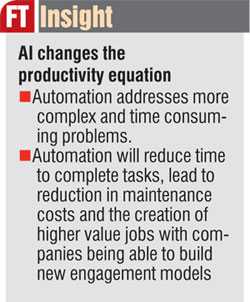
He quoted Forbes’ Louis Columbus’State of Cloud Adoption and Security 2017 report, which said that in 15 months 80% of all IT budgets would be committed to Cloud apps and solutions.
He cited Gartner Research’s Dave Cappuccio’s The Data Center is Dead 2018, which said 80% of enterprises would have shut down their traditional data centers by 2025.
He also quoted Niall Browne of CISO, Domo, saying that in 2017 the Cloud could be the most secure place for data.
Confirming one of the past predictions coming true, Hurd said Forrester Research’s 10 Cloud Computing predictions for 2018 stated that Oracle, Salesforce and Microsoft together had a 70% share of all SaaS revenue. With reference to AI, he said Gartner analyst Jim Hare in 2017 said AI technologies would be in almost every new software product by 2020.